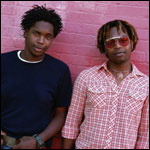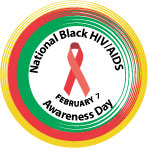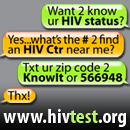Blacks & HIV/AIDS
 February 7, 2009 marks the ninth annual National Black HIV/AIDS Awareness Day (NBHAAD). This is a national community mobilization, HIV testing, and treatment initiative, which promotes awareness of, and access to, services for African Americans. The theme for NBHAAD 2009 is "Black Life is Worth Saving."
February 7, 2009 marks the ninth annual National Black HIV/AIDS Awareness Day (NBHAAD). This is a national community mobilization, HIV testing, and treatment initiative, which promotes awareness of, and access to, services for African Americans. The theme for NBHAAD 2009 is "Black Life is Worth Saving."
 Of all racial and ethnic groups in the United States, HIV and AIDS have hit African Americans the hardest. The reasons are not directly related to race or ethnicity, but rather some of the barriers faced by many African Americans. These barriers can include poverty (being poor), sexually transmitted diseases, and stigma (negative attitudes, beliefs, and actions directed at people living with HIV/AIDS or directed at people who do things that might put them at risk for HIV). HIV remains a persistent threat to the health, well-being, and human potential of many African American communities. As the impact of the epidemic among African Americans has grown, the Centers for Disease Control and Prevention (CDC), state and local public health agencies, and African American communities have stepped up efforts to address the crisis.
Of all racial and ethnic groups in the United States, HIV and AIDS have hit African Americans the hardest. The reasons are not directly related to race or ethnicity, but rather some of the barriers faced by many African Americans. These barriers can include poverty (being poor), sexually transmitted diseases, and stigma (negative attitudes, beliefs, and actions directed at people living with HIV/AIDS or directed at people who do things that might put them at risk for HIV). HIV remains a persistent threat to the health, well-being, and human potential of many African American communities. As the impact of the epidemic among African Americans has grown, the Centers for Disease Control and Prevention (CDC), state and local public health agencies, and African American communities have stepped up efforts to address the crisis.
NBHAAD is planned, organized and coordinated by the Strategic Leadership Council*, a working group of national organizations in partnership with CDC. NBHAAD activities focus on motivating individuals to get tested and know their HIV status, and educating community members about the importance of HIV prevention, early detection, and treatment.
CDC is highly committed to reducing the impact of HIV on African American communities. CDC believes that a collaborative response by many is necessary to decrease the burden of HIV/AIDS among African Americans. Therefore, CDC and African American leaders from business, civil rights, entertainment, government, and the media are speaking out and taking action. With these partners, CDC is intensifying HIV prevention efforts in four areas: expanding the reach of comprehensive prevention programs; increasing opportunities for HIV testing and treatment; developing new, effective prevention strategies; and mobilizing broader community action.
It is necessary for African Americans to receive the information they need to protect their health and the health of their loved ones, and to get involved in their communities. When people affected and infected by HIV take collective action against the spread of this disease, we form a very powerful weapon. Together we can prevent HIV/AIDS, one voice, one experience, one community at a time!
What Can You Do?
- Learn About HIV/AIDS. Educate yourself, friends, and family about HIV/AIDS and what you can do to protect yourself.
- Get tested for HIV. To find a testing site near you, call 1-800-CDC-INFO, visit hivtest.org, or, on your cell phone, text your zip code to Know IT (566948).
- Speak Out against stigma, homophobia, racism, and other forms of discrimination associated with HIV/AIDS.
- Donate time and money to HIV/AIDS organizations that work within African American communities.
Organizations Are Encouraged To:
- Promote NBHAAD within your organization. Organizations and agencies are getting involved in support of NBHAAD across the nation. HIV awareness and testing events will provide thousands of African Americans with the important information they need to protect their health, their loved ones, and get involved.
- Encourage employees to get involved in NBHAAD activities.
- Educate staff about HIV/AIDS.
 Develop HIV/AIDS policies for the workplace.
Develop HIV/AIDS policies for the workplace.
National Black HIV/AIDS Awareness Day Resources:
- NBHAAD Podcast: Dr. Kevin Fenton of CDC talks about the HIV epidemic in the African American community and steps everyone can take to stop the spread of HIV. (
 5:18 mins)
5:18 mins)
- National Black HIV/AIDS Awareness Day 2009*
- HHS Office of Minority Health Resource Center: NBHAAD
More Information
- CDC HIV/AIDS: African Americans, CDC's Web site on HIV/AIDS and African Americans
- HIVtest.org
- AIDS.gov: Minority Communities
- CDC Business and Labor Responds to AIDS, CDC's HIV/AIDS resource for businesses and labor organizations
- CDC National Prevention Information Network (NPIN), the US reference, referral, and distribution service for information on HIV/AIDS, sexually transmitted diseases (STDs), and tuberculosis (TB)
Current Features
Need info on a
different topic? See



